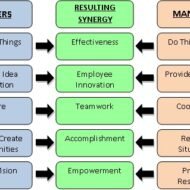Posted by Managementguru in Video Lecturers
on Apr 20th, 2014 | 0 comments

Strategic Management Video Lecture by David Kryscynski This is the introduction lecture for Strategic Management. Very Innovative and Informative video. A List of Strategic Management Terms Business – A strategy that pertains to single departments or units within a company.Combination – A type of grand strategy that employs several different grand strategies at once.Concentration – A growth strategy that extends the sale of current products or services to a company’s current market.Differentiation – A business strategy that strives to make the company’s product or service unique.Diversification – A growth strategy that moves a company into a similar kind of business with new or different products or services.Divestiture – A type of defensive strategy in which a company sells some part of its business, often an unprofitable part.Evaluating – The process of continuously monitoring the company’s progress toward its long-range goals and mission.Focus – A business strategy that directs marketing and sales towards a small segment of the market.Formal – The type of planning that involves systematic studying of an issue and the preparation of a written document to deal with the problem.Formulating strategy – Developing the grand- and business-level strategies to be used by the company.Functional – A strategy which involves short-range operational plans which support business strategies by emphasizing practical implementation.Goal – A concise statement that provides direction for employees and set standards for achieving the company’s strategic planGrand – A type of strategy that provides overall direction for the company.Growth – A type of grand strategy developed when a company tries to expand sales, products, or number of employees.Implementing – Putting a strategy to work after it has been formulated.Intermediate – Covers the time span between short-range and long-range, usually 1-3 years or 1-5 yearsLiquidation – A type of defensive strategy in which the entire company is sold or dissolved.Long Term– A three-to-five year period of time, but possibly as far as 20 years into the future.Mission Statement – A brief summary explaining why a company exists.Operational – Short-range planning that focuses on forming ideas for dealing with specific functions in the company.Overall Cost Leadership – A business strategy that is designed to produce and deliver a product or service for a lower cost than the competition.Planning – The process that businesses use to decide the company’s goals for the future and the ways to achieve those goals.Policy – A broad general guide to action that establishes boundaries within which employees must operate.Procedure – A detailed series of related steps of tasks written to implement a policy.Retrenchment – A type of strategy that aims to reverse negative trends in a company, such as losses in sales.Rule – A specific and definite corporate action that employees must follow.Short Term– A one-year period of time.Stability – A type of strategy that aims to keep the company operating at the same level that it has for several years.Strategic – Long-range planning done by the highest management levels in the company.Strategic Management – The application of the basic planning process at the highest levels of the company.Strategy – An outline of the basic steps management is going to take to achieve a goal.SWOT Analysis – The most utilized process for determining a company’s overall health; it involves analyzing internal strengths, internal weaknesses, external opportunities, and external threats.Turnaround – A type of defensive strategy that is used to regain success.Vertical Integration – A growth strategy that moves a company into a market it previously served either as a supplier or as a customer. Take The Test to Check Your Strategic...

Posted by Managementguru in Business Management, Human Resource, Leadership, Organisational behaviour, Principles of Management
on Mar 17th, 2014 | 0 comments

Leader vs. Manager – what is the connecting thread? Who is a Leader? A leader is always looked up to, by his followers as they are truly inspired by his personality, behavior and the power of his words and actions. The intellectual ability of a leader is definitely on the higher scale than a non-leader and also the perceptual ability and decision making skills are amazing. The main idea of pondering over leadership is that how the qualities of a leader make him more successful and how those unique qualities can be acquired by a manager of a firm to influence a group towards achievement of goals. What makes a leader unique? Every individual is bestowed with at least one special quality that makes him unique. A leader obviously is inherent with so many good traits and qualities that influence others and the best part of the story is that he understands his own potential and employs the right skills at the right time. It is basically a personal quality of character in a man that influences the behavior of others in a productive manner. Top 10 qualities of an effective leader; A man of charisma-the followers should be attracted by his magnetism and willingly contribute to the cause Should have a clear idea of future plans-Here he differs from the manager who is concerned more about the productivity Should be action-oriented, dare to achieve the impossible Should be tough at heart -stick to his principles and not a victim to circumstances Should be flexible, when it comes to the #welfare of his people Maintain integrity and humility Value-driven to gather trust Open and honest in his endeavors Creative-the ability to think out of the box Should possess sense of humor that makes him an affable person and even serious issues can be dealt with ease Is Manager a Leader too? Is it necessary that a manger has to be a good leader too? Of course yes. By virtue of being selected for the post of the manger, a person cannot manage the show. Unless he possesses the true qualities of a leader he cannot pull the strings tight and lead the organization in the right track. Without the right elements of leadership, he merely becomes a care-taker enjoying his pay and perks. He will not be liked by his subordinates if he doesn’t have that drive to make a mark of himself as an assertive person and in due course of time either he becomes the entertainer of the firm or he loses his integrity, both of which is not good for the organization’s efficiency and productivity. Roles of an efficient manager: A manager has the necessity to prove himself in terms of planning, formulating strategies, successful completion of targets, increased production, increased sales, acquisition of more orders, managing his team without much conflicts and above all make the team to abide by and obey his rules. A manager to be a successful leader need not be aggressive to prove his point but tough and determined to get things done. Big corporate firms frame ‘systems’ which are nothing but templates of action incorporating all the elements needed for execution in a tailor made fashion. A manager has to now focus on the strategic elements of management since the technicality is being taken care of by the systems. What is the right management approach? Managers expect subordinates to nod their heads in approval to whatever they say. This not the right approach; there should always be a reciprocal relationship between both the parties as in the case of a leader and his followers. A give and take policy makes you more...




